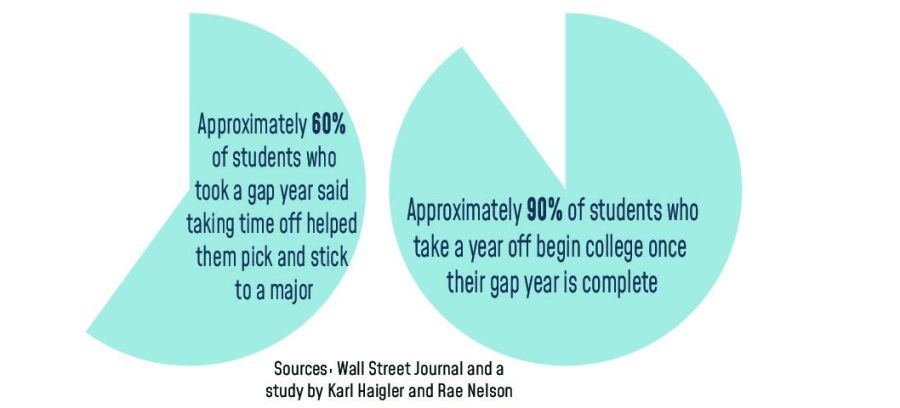As students of a college prep school, the general assumption is that we will all end up going to a traditional and reputable college. However, many students fail to realize that there is a world beyond four-year colleges, which have been a foundational focus of our education. At Trinity Prep, students don’t always consider the idea of deferring college or first attending a community college.
“Most students have a variety of times they can begin [college], which means that a traditional fall start is not the only or the most ideal path for everyone,” college counselor Maya Lupa said.
Commonly called a “gap year,” deferring college has many negative connotations; the biggest one being that a student won’t end up going back to school. However, according to the Wall Street Journal, approximately 90% of students who take a year off begin college once it’s complete. Others view a gap year as a “waste time.” It’s so heavily stigmatized that the idea of telling friends and family may be enough to deter people entirely. What a lot of people fail to consider are the benefits of taking time off to a person’s overall well-being.
“The gap year was the greatest thing I have ever done and probably will ever do,” Class of 2018 alumna Lily Israel said. “I went on a structured gap-year program. I went on a program called Nativ. It was 9 months in Israel. It was a year of learning and growth. I got to college and didn’t necessarily feel more mature than everyone, but I wasn’t as scared. I grew more in the gap year than I ever had before.”
For many, the transition from high school to college is incredibly jarring and can seem generally exhausting after four years of high school. A gap year can provide the opportunity to pursue activities that feel more pressing than immediately continuing on to a formal education.
“About halfway through senior year I basically said to myself I can’t see myself going to college next year for whatever reason,” Israel said. “I wasn’t too young or immature for college. I just knew that there was this opportunity I could do and couldn’t pass it up. [There was] really no downside. I didn’t feel behind in school.”
A gap year can also provide students time to attend to their mental health. A study at UCLA found that only 3% of American students take a year off before heading to college. However, a 2015 national alumni survey conducted by the American Gap Association found that 98% of those who took a gap year said it helped them develop as a person, 96% found it increased their self-confidence, and 93% agreed that it had increased their communications skills. This proves that for students who go back to college, the gap year is almost unanimously beneficial. You can enter college more mature, with a stronger sense of self, and a better idea of what you want to do with your life. You may also feel more fulfilled based on how you decide to spend your gap year.
Many students also feel there is a stigma around choosing to go to community college. The perception is that students who graduate a college prep school should then attend a four-year college. However, there are upsides to this different route upon high school graduation.
“Community colleges are often discounted as second-tier; however, due to the many pathways programs our wonderful colleges now offer, the stigma is slowly disappearing,” Lupa said. “Moreover, community colleges are significantly cheaper than four-year colleges and if finances are a consideration, there is no shame in exploring this option. Additionally, community colleges have honors programs which may enable a student to receive a scholarship and provide them with the type of support necessary to pursue further higher education.”
Community colleges can save thousands of dollars as state schools and private colleges are getting continually more expensive and more stingy with financial and merit aid. Students who finish at a community college can then transfer and graduate from a four-year college, earning the same degree as those who attended all four years at that four-year institution. Community college is valid not only on its own but also as a pathway to other colleges. As state and private schools are getting increasingly difficult to get into, community colleges can serve as a pathway into colleges a student may not originally get into.
“The reality is, with colleges, a lot of the time, it doesn’t matter where you start, it matters where you graduate from,” guidance counselor Rylan Smith said. “Following what’s best for you has a mental health benefit, whatever that may look like.”









